next
Introduction to the Critical and
Scholarly Discussion of Literature, Part 1
Lecture Basismodul 1, November 13, 2007
- Received notions on the question of “What is Literature?”: There are as many notions as people reading literature
- Second thoughts: Avoiding circular definitions
- More complex or differentiated perspectives: A short history of the discussion of literature
- Consequences 2: Understand how the debate of literature was constructed to reflect your personal participation
next
next
Origins of our literary discourse — look back on last lecture
| The most famous work of poetics, c. 350 BC |
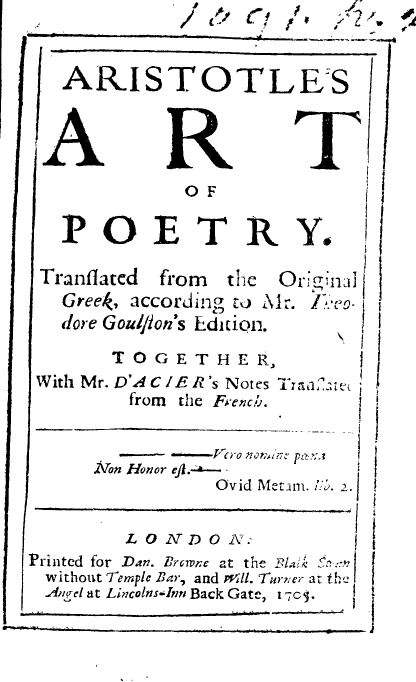 |
Aristotle, The Art of Poetry, translated into English after the French translation by André Dacier (1705) [ECCO] [Anglistik-server Oldenburg]
Concerned with (some of the) poetical (literary?) genres, yet not a history of literature |
| An early 18th century opera, 1712 |
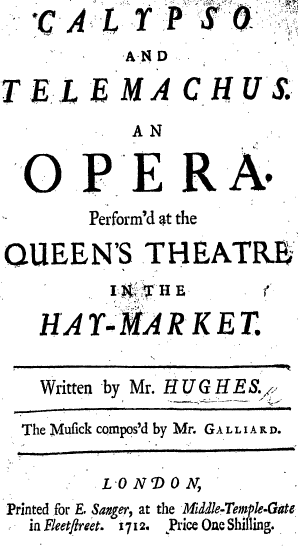 |
John Hughes, Calypso and Telemachus. An opera. Perform’d at the Queen’s Theatre in the Hay-Market. Written by Mr. Hughes. The musick compos’d by Mr. Galliard (London, 1712) [ECCO]
...an opera presented as poetry |
| The first history of romances, 1670 |
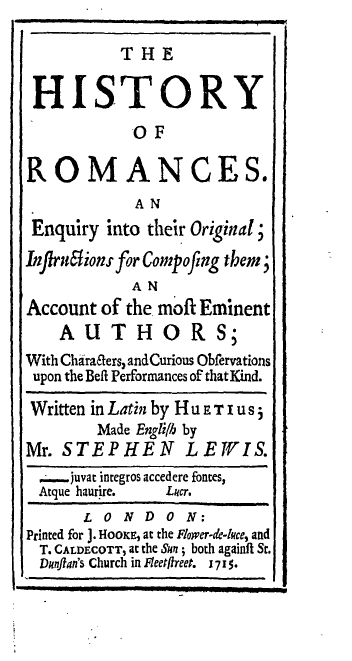 |
Pierre Daniel Huet, History of Romances, 1670, translated by Stephen Lewis (1715) [ECCO] [our edition]
...almost a history of literature (concerned with fictions), yet lacking focus on one nation |
| An early 18th-century “literary” journal, 1712 |
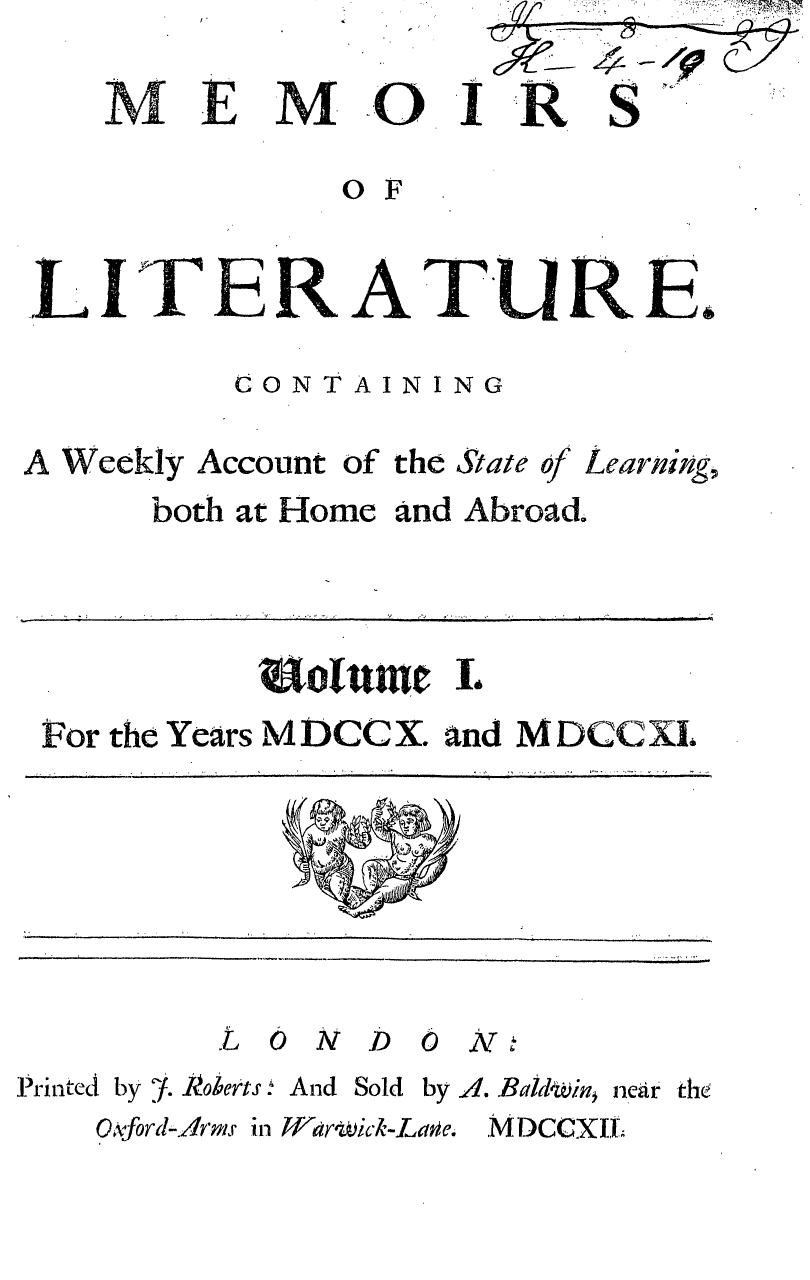 |
''Memoirs of literature. Containing a weekly account of the state of learning, both at home and abroad. Volume I. For the years MDCCX and MDCCXI.'' (London, 1712-1714). [ECCO]
...discusses literature, without mentioning not a single literary text |
next
next
A confusion we all know how to handle:
- We have all got different concepts of “art” and “literature” — you can understand them either as
- personal concepts (determined by taste and the individual appreciation of texts) or as
- decisions in the room of ongoing debates (and identify them with shools and movements from “New Criticism” to “Cultural Studies”
- Your own definition will either be
- a call for peace (under your guidance)
- a proposal to begin an entirely new debate of literature
next
next
The more complex answer:
“literature” is what people discuss as “literature”
- looks like circular definition
- is in fact the straight way out of the circle
- ...the question is now: who discussed what as “literature”, and why did not we produce a stable definition?
next
next
A short history of the discussion of literature: Chapter 1
Literature (learning) becomes the object of a challenging debate: 1500-1750
- the learned bookmarket exploded and needed a monitoring practice
- literary journals became — on the continent — a platform of public debates
- the reviewer is hardly responisble for views he discusses
- the journalist develops a continuous consideration of ongoing affairs
- journals create stable collective audiences
- “histories of literature“ developed into bibliographies of scientific research
next
next
A short history of the discussion of literature: Chapter 2
The “belles lettres” become the field to be dicussed in front of the wider audience: 1600-1800
- the “belles lettres” developed as the market of fashionable books adressing learned readers, connoisseurs, the aristocracy, urban elites, the younger generation, both men and women
- French “belles lettres” printed in the Netherlands swept the market between 1650 and 1720 — a production no longer controlled by any nation
- “polite literature”, “galante Wissenschafften”, “schöne Wissenschaften”, “schöne Literature” become equivalent English and German terms between 1670 and 1800
- the “belles lettres” offer a spectrum of genres from memoirs to fiction and poetry — they do not develop a debate on perfection to be achieved in each genre, they rather develop a debate of ever new fashions
- the debate of the “belles lettres” demands taste and knowledge rather than pedantry and an adherence to rules
- the market of fashionable materials is espiecially prone to scandal
next
next
A short history of the discussion of literature: Chapter 3
The “poetry” of the nation becomes the special field of a popular national debate within the field of the “belles lettres”: 1730-1830
- scholars discussing poetry — in defiance of the French and the Italian opera — call for responsible national productions of Aristotelian tragedies
- the debate of poetry becomes a central field within the debate of the “poetry” as it demands both scholarly expertise and taste
- the call for a national production of “poetry” creates the test case for 18th and early 19th century German nationalism
- poetry does ultimately call for a new definition of literature as the field of “aesthetic” texts, of texts “crafted with art”
next
next
A short history of the discussion of literature: Chapter 4
The discussion of “romances”/“novels”/“prose fiction” creates a new field of cultural criticism: 1670-1800
- Pierre-Daniel Huet introduced the debate
- transferring the art of interpretation from the field of theology to the field of fiction
- interested in a world wide history of fictions
- the analysis of fictions becomes a challenge as soon as it is turned on the nation and its poetry (a development of the second half of the 18th century)
- the novel does ultimately call for a new definition of literature as the field of texts with a (hidden) deeper meaning
next
next
| |
|
profit |
handicap |
The discussion of literature
appropriating the debate of
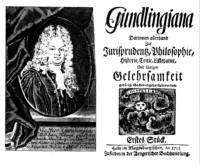 |
learning |
• adresses the learned world |
• lacks a solid task |
| learned publications |
• observes the book market
• establishes a critical secondary discourse on an ongoing production
• offers a safe position (I am only reviewing) |
• subjects the sciences to a general and popular debate
• lacks a field of general attraction |
| belles lettres |
• introduces a scandalous subject matter of wide appeal
• allows personal perceptions |
• does not lead to national critical debates |
| poesy |
• allows to attack the field still dominated by the opara
• introduces an object of special knowledge
• creates a field of quasi natural national individualism |
• suffers the restriction to a debate of poetics and perfection |
| fiction |
• allows (thanks to Huet) the interpretation of poetry, plays and novels as cultural indicators
• allows a canon of works of the past |
|
next
next
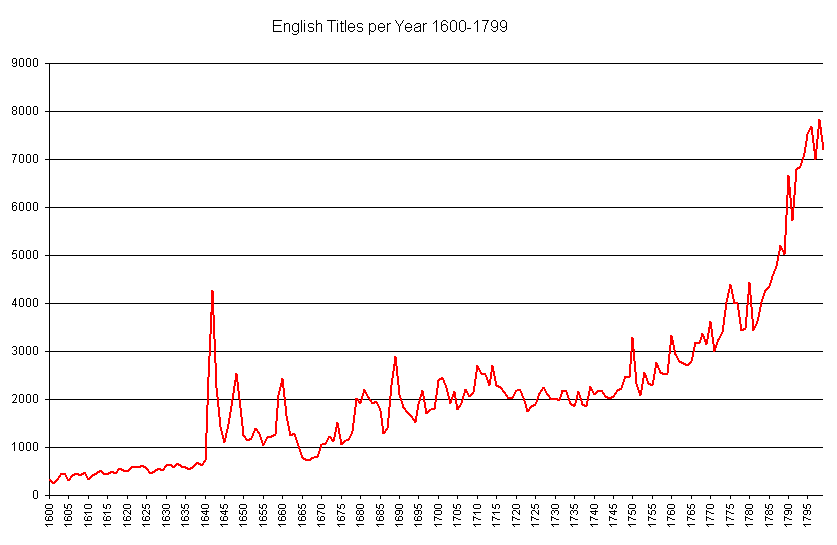
next
next
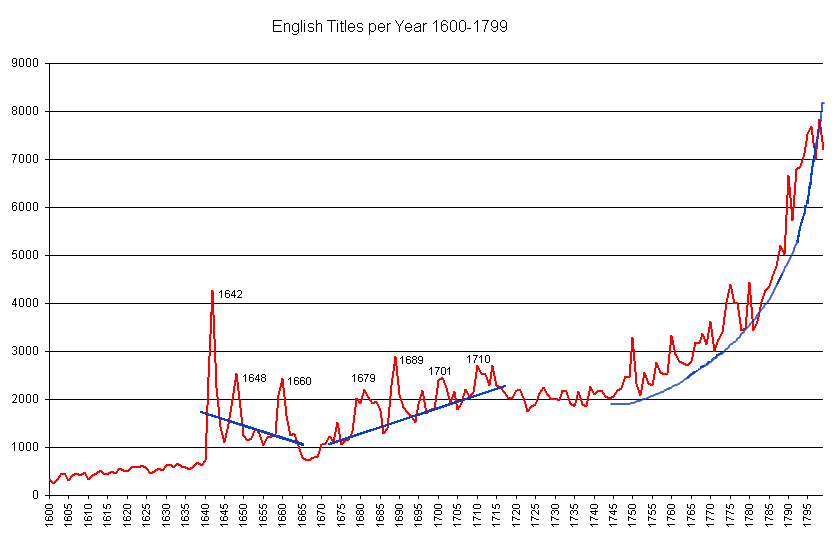
next
next
Around 1700: total production 2000 titles
- 15% (c. 300 titles) belles lettres: fashions, memoirs, history, fiction, poetry...
- 30 novels, romances and dubious histories
- 30 books of poetry from opera and comedy to verse miscellany
- 5% (c. 100 titles) cheap market including its own production of romances, fables, legends
- 80%: theology, history and politics, learning
next
next
A short history of the discussion of literature: Chapter 5
The national literatures become the object of the new secular educational sytems: 1800 to the present
- Germany creates the new object of national education between 1750 and 1830, France around 1800, Great Britain and America another fifty years later
- the question “What is literature?” is turned into an open debate of
- the “canon“, i.e. the body of works deserving our national veneration
- the appreciation, the understanding and the discussion these works deserve
- theories of literature and schools of criticism compete with proposals what we should properly do with literature
- individual readers offer their personal views in search of peace or in support of individuals envolved in the debate
next
next
Das Nationaltheater — München, 1950
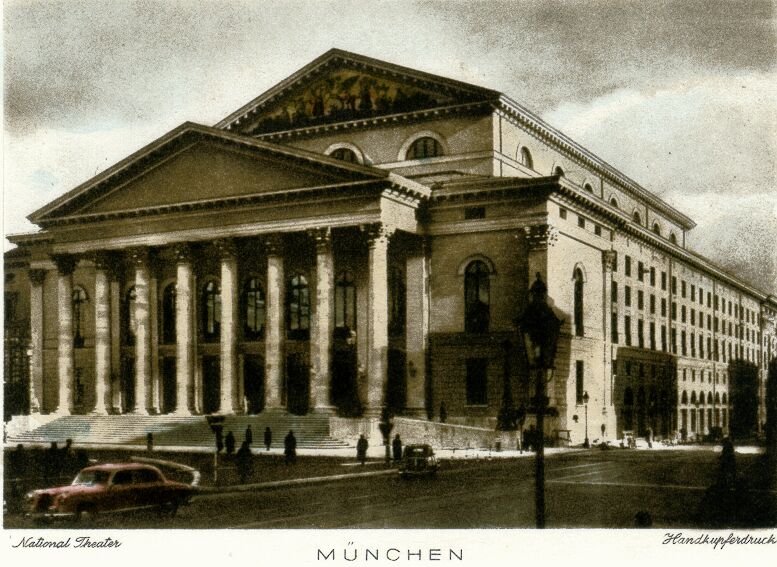
next
next
Built on a field the secularisation provided
1750 |
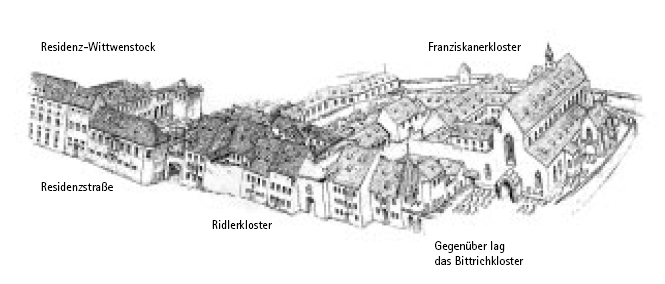 |
|
1850 |
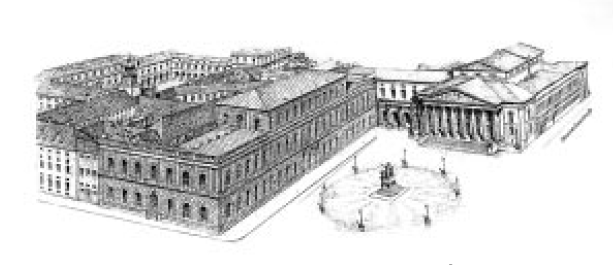 |
Nationaltheater |
|
Königsbau der Residenz |
|
From Stefan Benz, “Entsorgte Erinnerung. Münchner Frauenklöster - gefeiert, verfemt, vergessen”, Aviso 3 (2005), p.42-47
http://www.stmwfk.bayern.de/downloads/aviso/2005_3_aviso_42-47.pdf
next
next
Munich’s Residenz, 2nd floor: celebrating Germany’s new poetry
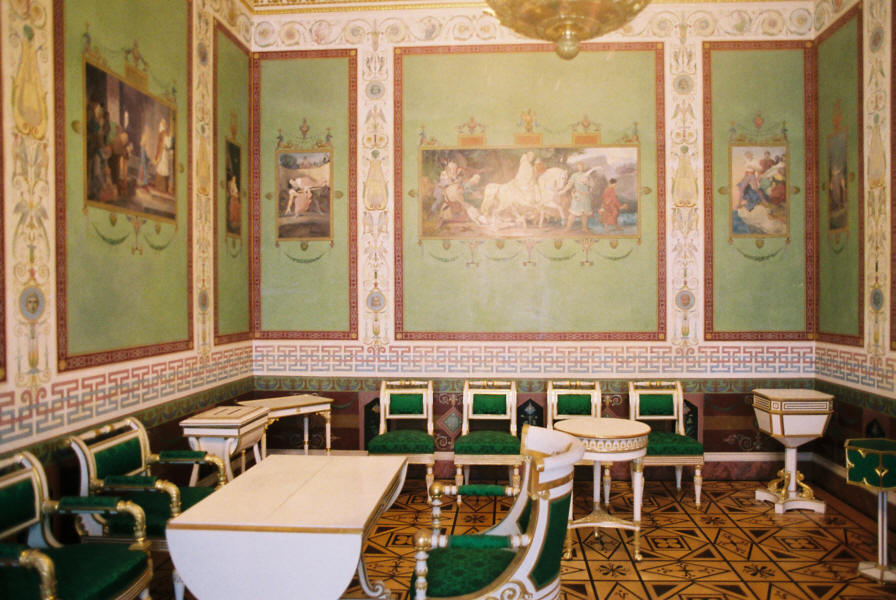
next
next
Munich’s Residenz, 2nd floor: celebrating Germany’s new classicism
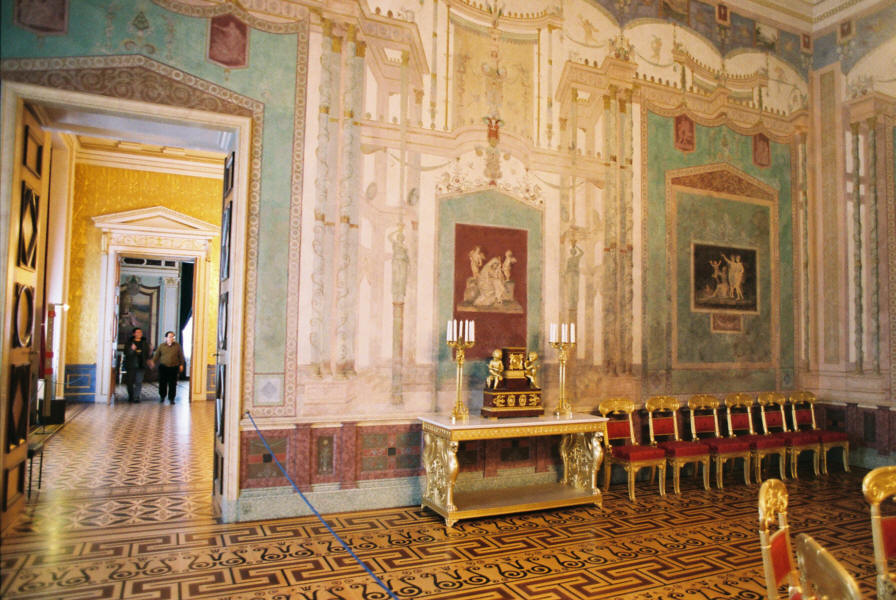
next
next
Munich’s Residenz, 2nd floor: celebrating Germany’s discovery of the ancient Greece
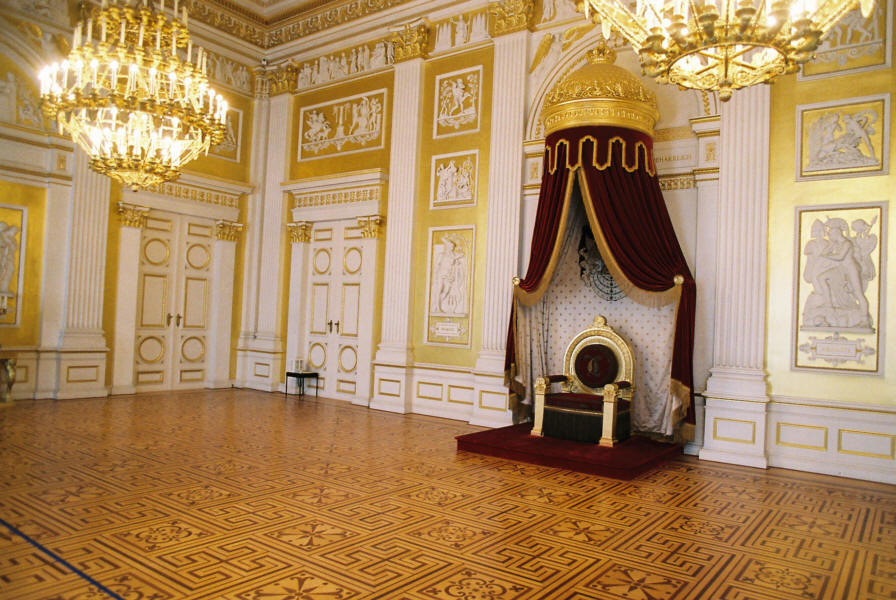
next
next
Munich’s Residenz, 1st floor: Nibelungensäle — celebrating Germany’s Middle Ages
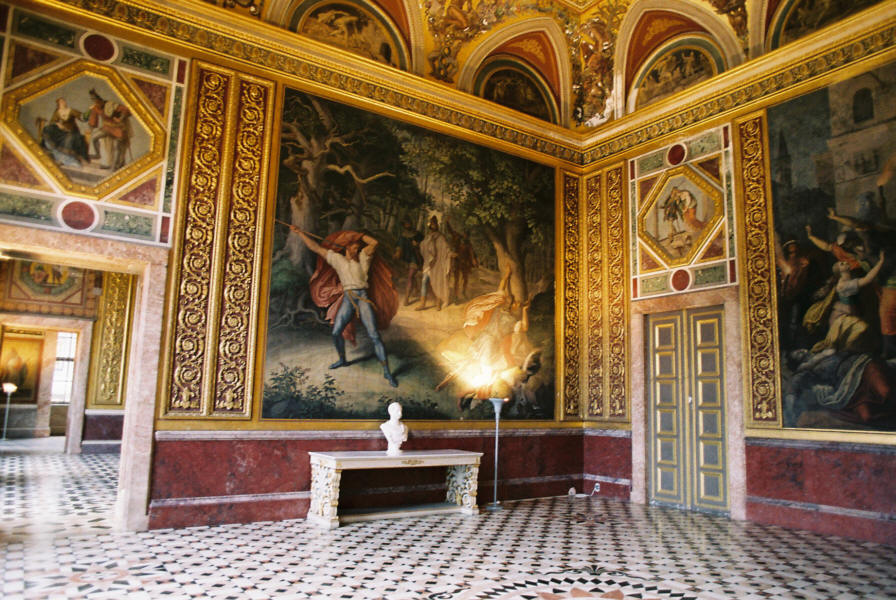
next
next
Munich’s Residenz, 1st floor: Nibelungensäle — celebrating Germany’s Middle Ages
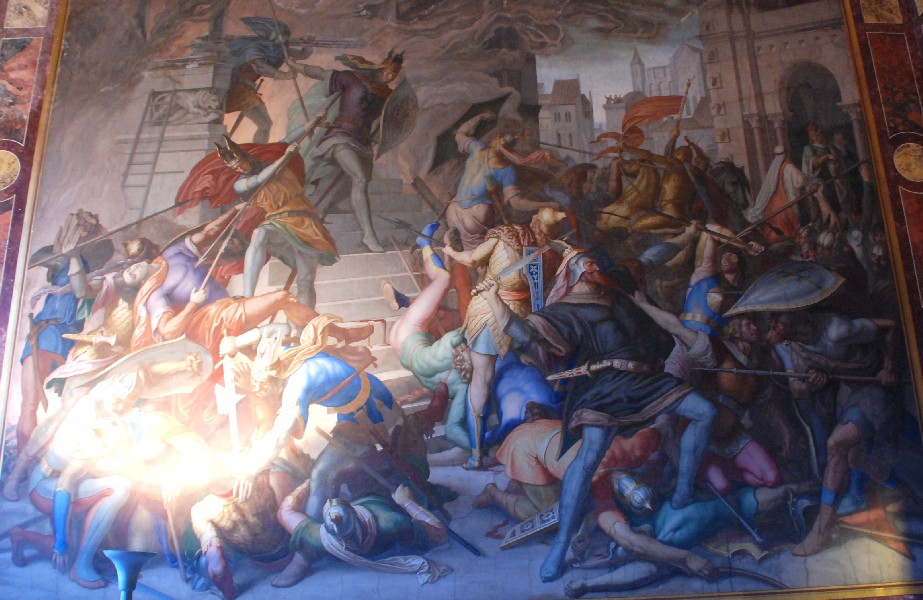
next
next
Munich’s Residenz, 1st floor: Nibelungensäle — celebrating Germany’s Middle Ages
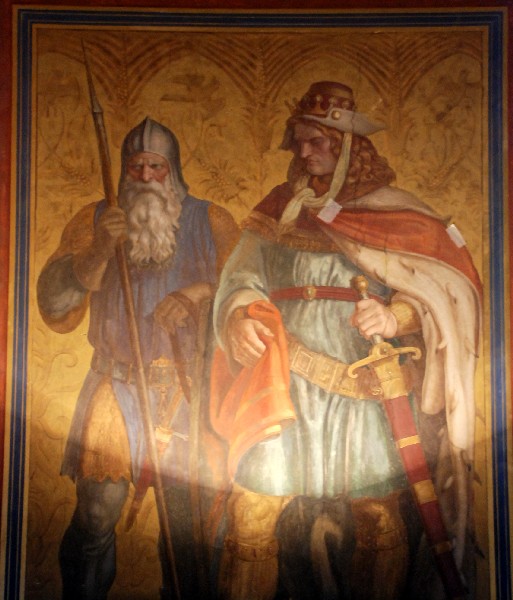
next
next
The first German history of literature: The focus on the nation creates a political dimension
Ich habe es unternommen, die Geschichte der deutschen Dichtung von der Zeit ihres Entstehens bis zu dem Puncte zu erzählen, wo sie nach mannichfaltigen Schicksalen sich dem allgemeinsten und reinsten Charakter der Poesie und aller Kunst überhaupt, am meisten und bestimmtesten näherte. Ich mußte ihre Anfänge in Zeiten aufsuchen, aus welchen kaum vernehmbare Spuren ihres Daseins übrig geblieben sind; ich mußte sie durch andere Perioden verfolgen, wo sie bald unter dem Drucke des Mönchthums ein unwürdiges Joch duldete, bald unter der Zügellosigkeit des Ritterthums die gefährlichste Richtung einschlug, bald von dem heimischen Gewerbestand in Fesseln gelegt und oft von eindringenden Fremdlingen unterdrückt ward, bis sie von allgemeiner Aufklärung unterstützt sich in Mäßigung frei rang, ihr eigener Herr ward und schnell die zuletzt getragene Unterwerfung mit rächenden Eroberungen vergalt. Welche Schicksale sie litt, welche Hemmungen ihr entgegentraten, wie sie die Einen ertrug, die Anderen überwand, wie sie innerlich erstarkte, was sie äußerlich förderte, was ihr endlich eigenthümlichen Werth, Anerkennung und Herrschaft erwarb, soll ein einziges Gemälde anschaulich zu machen versuchen.
Geschichte der poetischen National-Literatur der Deutschen von Dr. G. G. Gervinus. Erster Theil. Von den ersten Spuren der deutschen Dichtung bis gegen Ende des 13. Jahrhunderts (Leipzig: W. Engelmann, 1835), p.1.
next
next
Germany’s Walhalla — errected in the 1840s
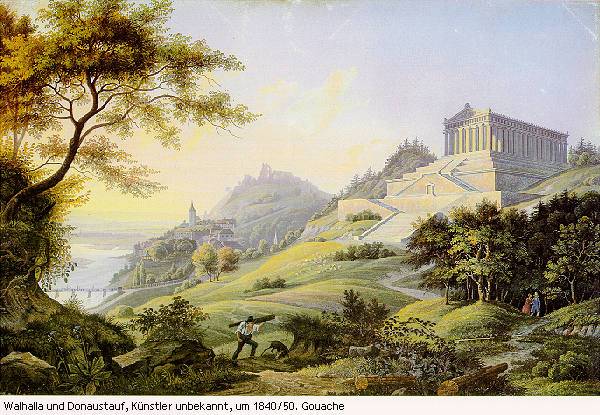
next
next
“Literature” — under the patronage of the national state
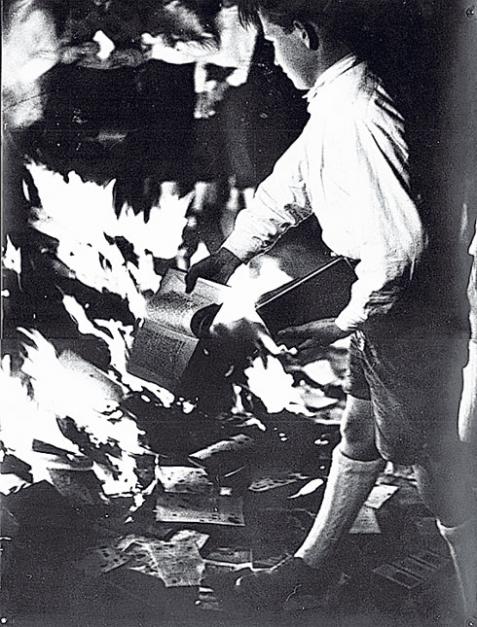
next
next
A literary journal of the 1820s: the term still open to all fields of the old literary production
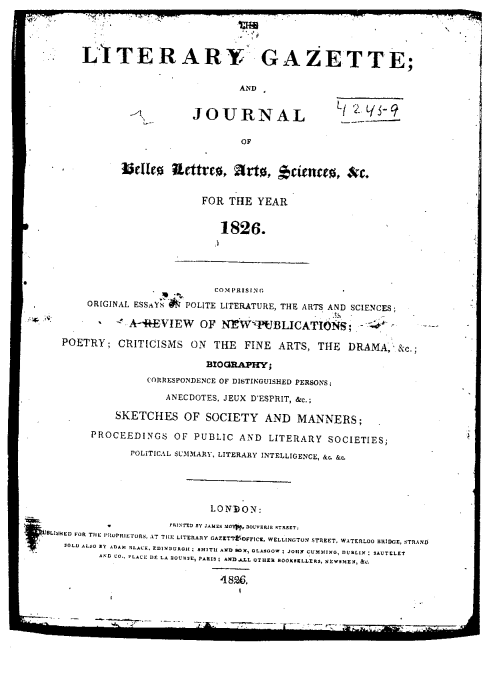
next
next
Continental Historians influenced the creation of English literature
HISTORY, within a hundred years in Germany, and within sixty years in France, has undergone a transformation owing to a study of literatures.
The discovery has been made that a literary work is not a mere play of the imagination, the isolated caprice of an excited brain, but a transcript of contemporary manners and customs and the sign of a particular state of intellect. The conclusion derived from this is that, through literary monuments, we can retrace the way in which men felt and thought many centuries ago. [...]
We have meditated over these ways of feeling and thinking and have accepted them as facts of prime significance. We have found that they were dependent on most important events, that they explain these, and that these explain them, and that henceforth it was necessary to give them their place in history, and one of the highest. This place has been assigned to them, and hence all is changed in history—the aim, the method, the instrumentalities, and the conceptions of laws and of causes.
Hippolyte Adolphe Taine, Introduction to The History of English Literature (1863).
next
next
The late development of English literature
- the market of international belles lettres was particularly powerful in London
- literary criticism had to compete with national debates over political and religious questions
- neither Great Britain (Anglican church with king functioning as head of the church) nor the United States (country of religious dissent) needed a period of secularization
next
next
Ian Hunter (1988): English literarture rose as a subject to be taught at schools
- “English emerged as the privileged vehicle for the techniques of moral training.”
- “English emerged as specialised pedagogy based on correction through self-expression.”
- “English took shape in, and remains inseparable from, a special teacher-student relationship.”
- “English appeared in the guise of a new formation of the literary text and a new kind of literary reading.”
If modern criticism has come to construe the literary reading as a ’raid on the infinite’, always incomplete, always marking a new beginning, this is not because (as it thinks) the literary text contains an inexhaustible supply of meaning due to its openness to an ever-changing domain of experience. Neither is it a sign that the text is a local manifestation of an ideal linguistic calculus capable of [129] infinite actualisations. Rather, it is a sign of the fact that the modern literary text, unlike the text of rhetoric or philology, is not an object of imitation or description, but a more recently elaborated device opening its reader to endless moral invigilation.
Ian Hunter, Culture and Government: The Emergence of Literary Education, Basingstoke: Macmillan, 1988, pp. 122-128.
next
next
Literary communication around 1700: An affair of the res publica literaria, pluralistic yet self centered
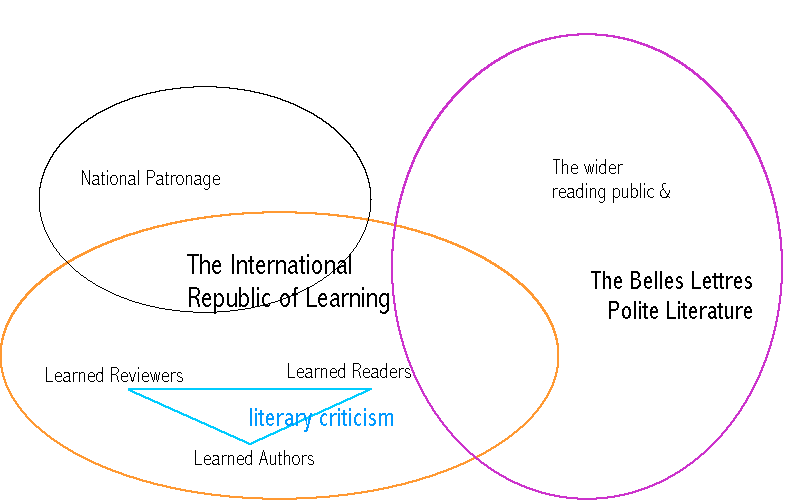
next
next
Literary communication today: An affair affecting the whole public, promoted by the nation yet pluralistic
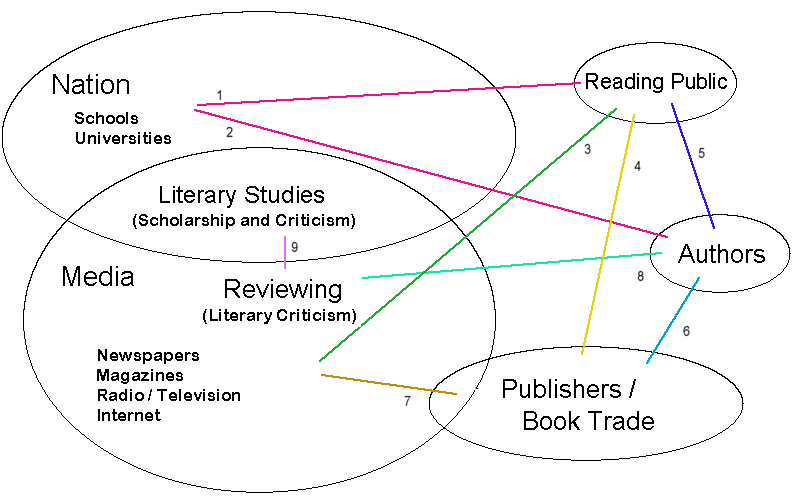
next
next
Why do we learn this?
To better understand why the question “What is literature?” is open
- it is open as we have integrated a complex debate of poetry which already could not agree on the proper qualities of poetry
- it is open as we cannot decide which fictions have the deepest and most important meanings
- it is open as we have a battle of interst groups protecting their individual debates of literature against each other and against the political influence the debate of literature attracts
next
next
Our course is advertised as an “Introduction to the Critical and Scholarly Discussion of Literature”
- the last two sessions were designed to offer an understanding of the different traditions our scholarly discussion of literature perpetuates
- it is a learned pluralistic debate - the heritage of the learned debate of literature
- it is a debate of poetical (today: “literary”) qualities as it has integrated the older debate of poetry
- it is a debate of the cultural significance of works with a deeper meaning as it has integrated the older debate of romances founded in the 17th century
- it is a debate on the nation’s fate since it developed its present momentum in the 19th century with the emergence of the national state
next
next
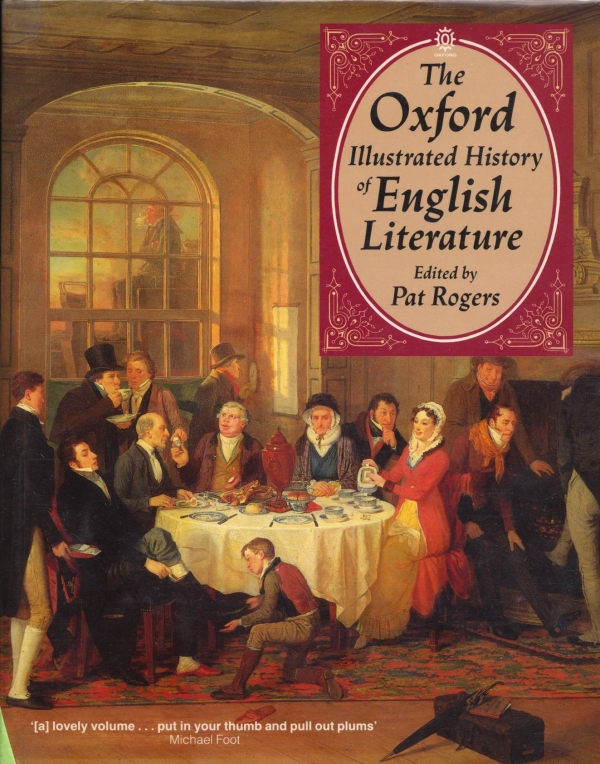
next
next
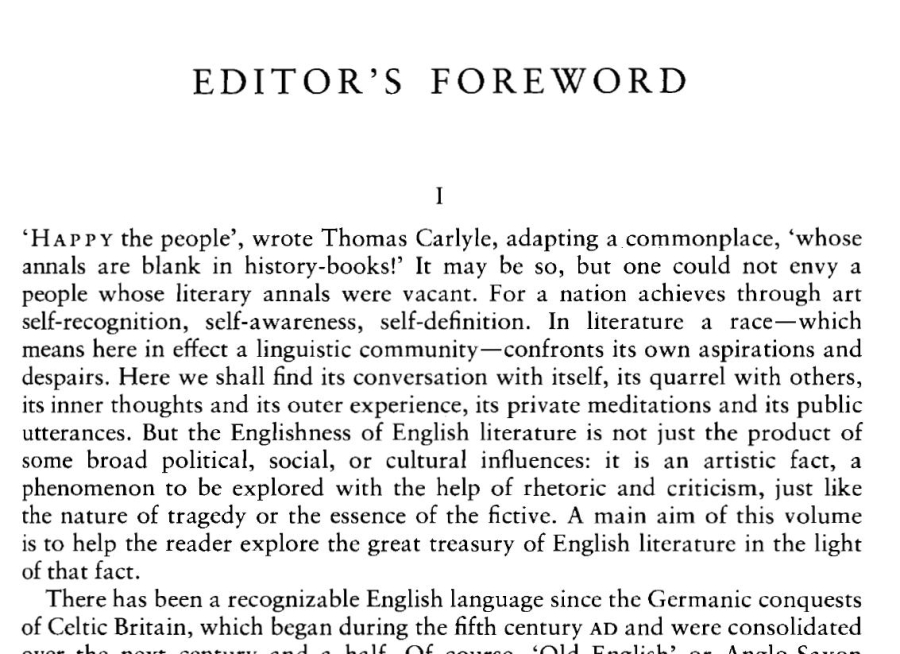
Anglistik Wiki Oldenburg
top






















